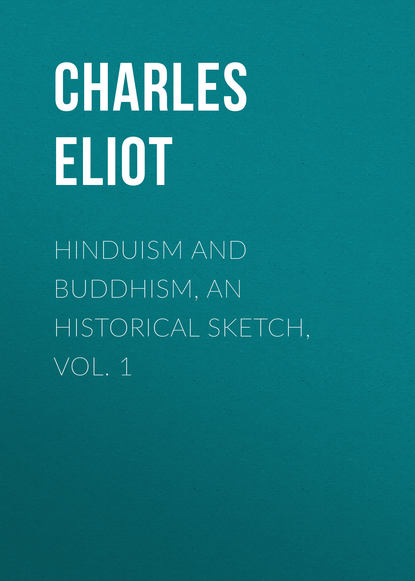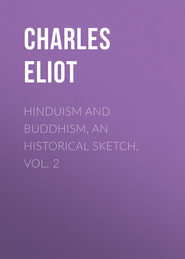По всем вопросам обращайтесь на: info@litportal.ru
(©) 2003-2024.
✖
Hinduism and Buddhism, An Historical Sketch, Vol. 1
Автор
Год написания книги
2018
Настройки чтения
Размер шрифта
Высота строк
Поля
349
Maj. Nik. 147.
350
In an exceedingly curious passage (Dig. Nik. IV.) the Brahman Sonadaṇḍa, while accepting the Buddha's teaching, asks to be excused from showing the Buddha such extreme marks of respect as rising from his seat or dismounting from his chariot, on the ground that his reputation would suffer. He proposes and apparently is allowed to substitute less demonstrative salutations.
351
Cullavagga V. 21 and Maj. Nik. 85.
352
Visâkhâ, a lady of noted piety. It was probably a raised garden planted with trees.
353
Maj. Nik. 110.
354
Dig. Nik. No. 2. Compare Jâtaka 150, which shows how much variation was permitted in the words ascribed to the Buddha.
355
Sam. Nik. XLII. 7.
356
Mahâparinib-sutta, 6. 20. The monk Subhadda, in whose mouth these words are put, was apparently not the person of the same name who was the last convert made by the Buddha when dying.
357
His personal name was Upatissa.
358
This position was also held, previously no doubt, by Sagata.
359
Mahavâg. X. 2. Compare the singular anecdote in VI. 22 where the Buddha quite unjustifiably suspects a Doctor of making an indelicate joke. The story seems to admit that the Buddha might be wrong and also that he was sometimes treated with want of respect.
360
VII. 2 ff.
361
The introductions to Jâtakas 26 and 150 say that Ajâtasattu built a great monastery for him at Gayâsîsa.
362
The Buddha says so himself (Dig. Nik. II.) but does not mention the method.
363
The Dhamma-sangaṇī defines courtesy as being of two kinds: hospitality and considerateness in matters of doctrine.
364
Maj. Nik. 75.
365
Mahāv. vi. 31. 11.
366
Cullavag. x. 1. 3.
367
Mahâparinib. V. 23. Perhaps the Buddha was supposed to be giving Ânanda last warnings about his besetting weakness.
368
Udâna 1. 8.
369
Compare too the language of Angela of Foligno (1248-1309) "By God's will there died my mother who was a great hindrance unto me in following the way of God: my husband died likewise and all my children. And because I had commenced to follow the aforesaid way and had prayed God that he would rid me of them, I had great consolation of their deaths, although I did also feel some grief." Beatae Angelae de Fulginio Visionum et Instructionum Liber. Cap. ix.
370
No account of this event has yet been found in the earliest texts but it is no doubt historical. The versions found in the Jâtaka and Commentaries trace it back to a quarrel about a marriage, but the story is not very clear or consistent and the real motive was probably that indicated above.
371
See Rhys Davids, Dialogues, II. p. 70 and Przyluski's articles (in J.A. 1918 ff.) Le Parinirvana et les funérailles du Bouddha where the Pali texts are compared with the Mûlasarvâstivâdin Vinaya and with other accounts.
372
This was probably written after Pâṭaliputra had become a great city but we do not know when its rise commenced.
373
She was a noted character in Vesâlî. In Mahâvag. viii. 1, people are represented as saying that it was through her the place was so flourishing and that it would be a good thing if there were some one like her in Râjagaha.
Maj. Nik. 147.
350
In an exceedingly curious passage (Dig. Nik. IV.) the Brahman Sonadaṇḍa, while accepting the Buddha's teaching, asks to be excused from showing the Buddha such extreme marks of respect as rising from his seat or dismounting from his chariot, on the ground that his reputation would suffer. He proposes and apparently is allowed to substitute less demonstrative salutations.
351
Cullavagga V. 21 and Maj. Nik. 85.
352
Visâkhâ, a lady of noted piety. It was probably a raised garden planted with trees.
353
Maj. Nik. 110.
354
Dig. Nik. No. 2. Compare Jâtaka 150, which shows how much variation was permitted in the words ascribed to the Buddha.
355
Sam. Nik. XLII. 7.
356
Mahâparinib-sutta, 6. 20. The monk Subhadda, in whose mouth these words are put, was apparently not the person of the same name who was the last convert made by the Buddha when dying.
357
His personal name was Upatissa.
358
This position was also held, previously no doubt, by Sagata.
359
Mahavâg. X. 2. Compare the singular anecdote in VI. 22 where the Buddha quite unjustifiably suspects a Doctor of making an indelicate joke. The story seems to admit that the Buddha might be wrong and also that he was sometimes treated with want of respect.
360
VII. 2 ff.
361
The introductions to Jâtakas 26 and 150 say that Ajâtasattu built a great monastery for him at Gayâsîsa.
362
The Buddha says so himself (Dig. Nik. II.) but does not mention the method.
363
The Dhamma-sangaṇī defines courtesy as being of two kinds: hospitality and considerateness in matters of doctrine.
364
Maj. Nik. 75.
365
Mahāv. vi. 31. 11.
366
Cullavag. x. 1. 3.
367
Mahâparinib. V. 23. Perhaps the Buddha was supposed to be giving Ânanda last warnings about his besetting weakness.
368
Udâna 1. 8.
369
Compare too the language of Angela of Foligno (1248-1309) "By God's will there died my mother who was a great hindrance unto me in following the way of God: my husband died likewise and all my children. And because I had commenced to follow the aforesaid way and had prayed God that he would rid me of them, I had great consolation of their deaths, although I did also feel some grief." Beatae Angelae de Fulginio Visionum et Instructionum Liber. Cap. ix.
370
No account of this event has yet been found in the earliest texts but it is no doubt historical. The versions found in the Jâtaka and Commentaries trace it back to a quarrel about a marriage, but the story is not very clear or consistent and the real motive was probably that indicated above.
371
See Rhys Davids, Dialogues, II. p. 70 and Przyluski's articles (in J.A. 1918 ff.) Le Parinirvana et les funérailles du Bouddha where the Pali texts are compared with the Mûlasarvâstivâdin Vinaya and with other accounts.
372
This was probably written after Pâṭaliputra had become a great city but we do not know when its rise commenced.
373
She was a noted character in Vesâlî. In Mahâvag. viii. 1, people are represented as saying that it was through her the place was so flourishing and that it would be a good thing if there were some one like her in Râjagaha.






